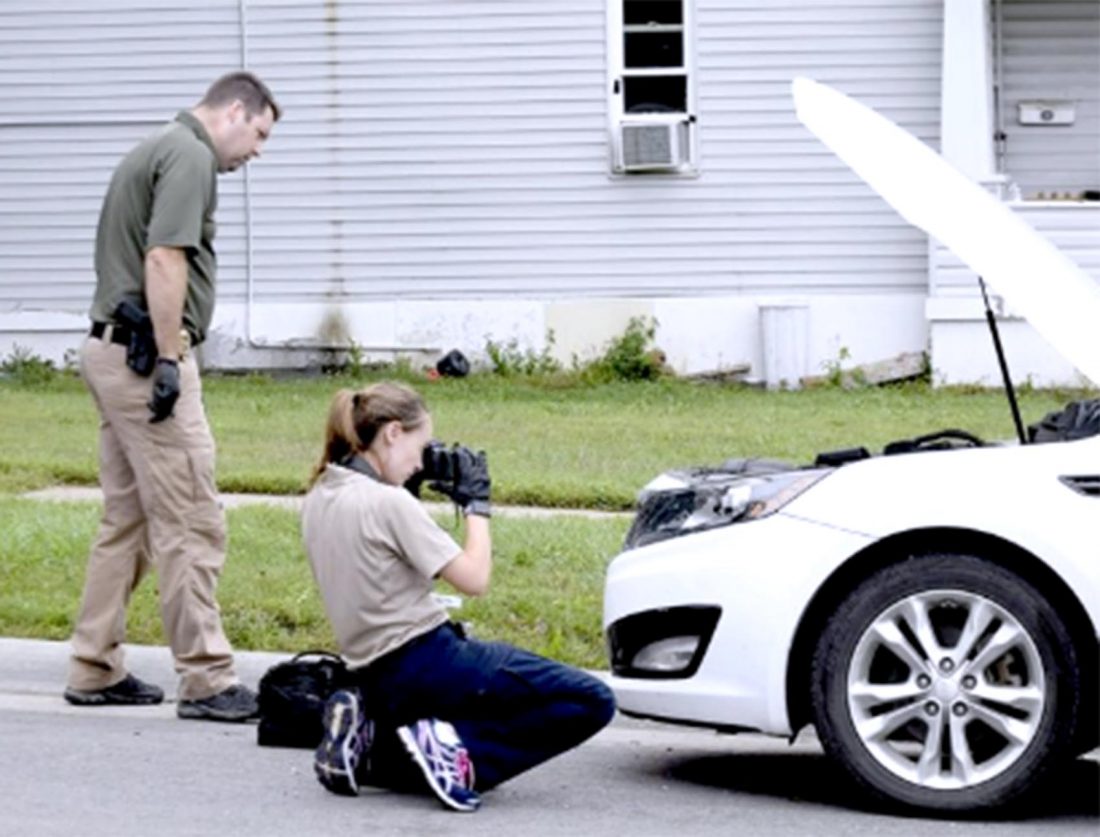Bending the thin blue line
Evidence tech wins Hometown Hero award for processing crime scene of Henderson killing
-
-Messenger file photo by Kelby Wingert
Brandi Weintzl, evidence technician with the Fort Dodge Police Department, takes photos of bullet entry points on a vehicle in the 900 block of Fourth Avenue North after a shooting incident in September 2019. Lt. Matt Lundberg watches at left.
-
-Messenger file photo
by Elijah Decious
In addition to collecting, processing and maintaining custody of evidence, Brandi Weinzetl sometimes testifies in court as part of her job, as seen here during Tanner King’s murder trial in 2019.

-Messenger file photo by Kelby Wingert
Brandi Weintzl, evidence technician with the Fort Dodge Police Department, takes photos of bullet entry points on a vehicle in the 900 block of Fourth Avenue North after a shooting incident in September 2019. Lt. Matt Lundberg watches at left.
Brandi Weinzetl has accomplished a lot of firsts at the Fort Dodge Police Department, but her reaction to a first that no one wanted proved to be a test of character not in her job description.
FDPD’s evidence technician, the first non-officer to fill the position, has seen crimes through nearly every stage of the process, from 911 calls to evidence collection to testifying in court.
“I always had an interest in how the case is presented from the 911 call to trial,” she said. “I thought I could be part of that.”
Originally a full-time dispatcher, Weinzetl has elevated and re-written her job description time and time again, making her the go-to person in the department for the latest in evidence collection and technique.
“She basically made it her own and has done a fabulous job taking over that, making our jobs a lot easier as far as evidence collection,” said Capt. Ryan Gruenberg, public information officer for FDPD. “Her work ethic and dedication to that position are unmatched.”

-Messenger file photo
by Elijah Decious
In addition to collecting, processing and maintaining custody of evidence, Brandi Weinzetl sometimes testifies in court as part of her job, as seen here during Tanner King’s murder trial in 2019.
Gruenberg said more and more agencies their size and larger now have dedicated evidence technicians, and it made a lot of sense to open the position up. The expansion has helped the department’s bandwidth, particularly in larger cases.
In 2014, the 911 dispatcher jumped on the chance to be an evidence custodian. Within a matter of weeks, the department said she started making vast improvements to the evidence collection and storage process, improving efficiency and upgrading technology.
But she didn’t stop there. Instead of waiting for the evidence to come in, she went to it.
“I always knew I wanted to do more, learn more,” Weinzetl said. “They supported and believed in me enough to send me to get training.”
After about a year on the job, she got the training to go out to crime scenes and search warrant executions to collect and process physical evidence like fingerprints, DNA and bullets casings–an unprecedented move for a member of the department who isn’t a police officer.
Weinzetl raised the bar so high that she was eventually given a captain’s office next to management.
“I like to understand the situation and try to find evidence, either what goes with (investigation theories) or finding more that nobody originally knew about,” she said.
New systems developed by her over the years keep better track of whether evidence is active or inactive, coordinating with prosecuting county attorneys and their needs for cases. By collecting much of the evidence herself, she has a better idea of what she can process herself and what needs to be sent to other agencies.
She estimates that she’s processed between 50 and 100 crime scenes in the last 5 years. The worst was October 2, 2019, the day her friend, the Rev. Al Henderson–a friend of every first responder–was killed in cold blood.
“I gained a friendship, I knew him since I was first a dispatcher,” she said. “He had been supportive of all of us.”
After realizing a loss of that magnitude, Weinzetl stood out in the cold, dark night, processing the scene to preserve an element of justice in the midst of grief.
“We divert to our training,” she said, explaining how she processed a crime scene where the victim made it personal. “We try to go through our checks to make sure we’re processing the scene the best way we possibly can. Every scene, we try to process that way.”
She didn’t have time to process her emotions before she had to process the crime scene.
That diversion is something she described as instinctual, kicking the mind into a focus to collect, photograph and carry out your duties. What’s more is that in doing her job, she processes justice out of tragedy.
In honor of her work on the scene that day, Serving Our Servants honored Weinzetl late in March with the Hometown Hero, a fitting award from an organization founded by Henderson.
“I was shocked, I felt very honored that supervisors and coworkers even considered or thought about me like that,” Weinzetl said of her reaction.
“The thin blue line that our law enforcement family famously holds so close and so dear bends to include Brandi Weinzetl,” a social media post from FDPD said after her award from Serving our Servants.
“It’s an honor to be able to work alongside them now,” Weinzetl said.




